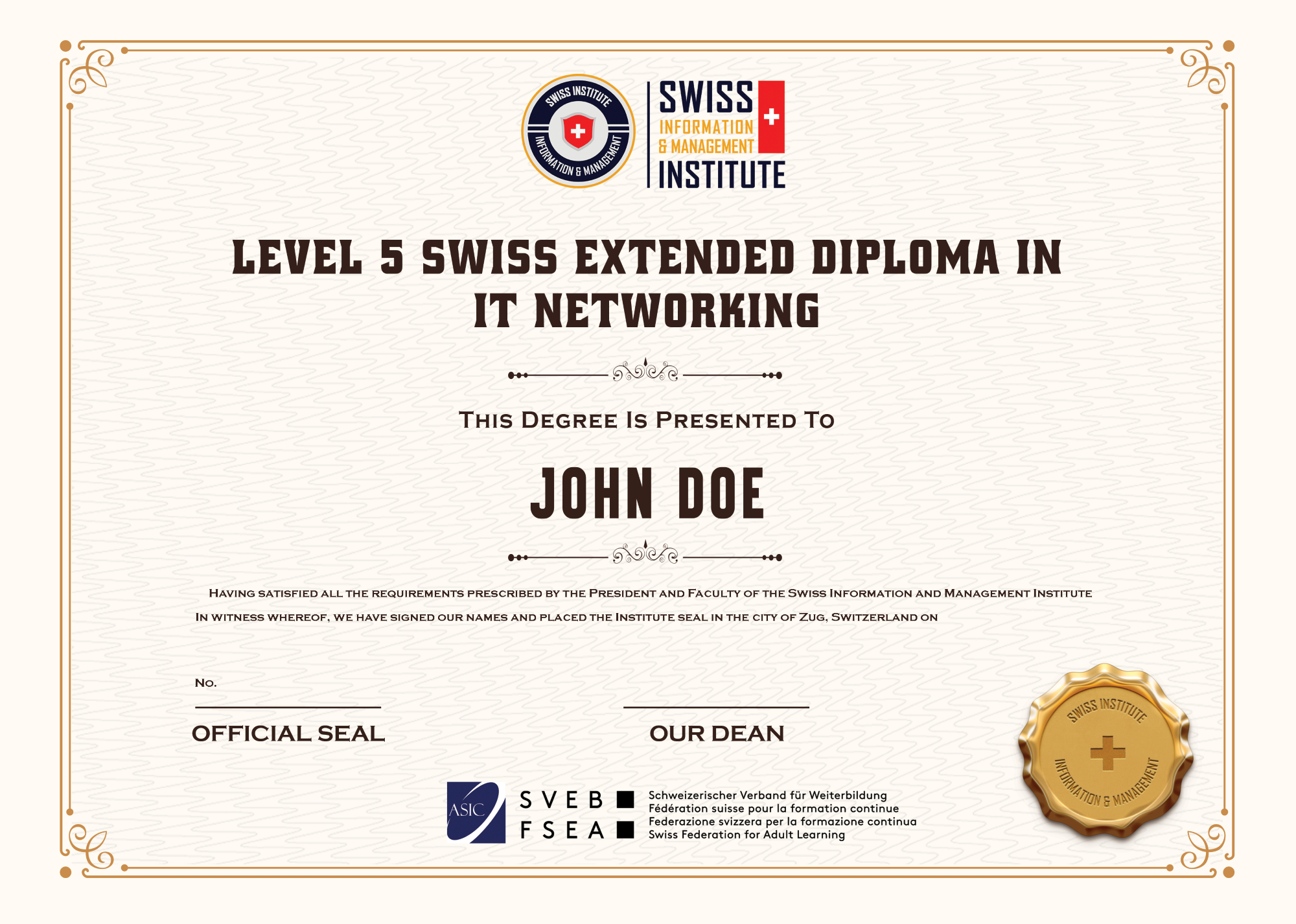- Why Swiss Diploma offers optimal educational effectiveness for learners?: CLICK HERE
- The meaning of Level System in the labor market in the context of global labor mobility: CLICK HERE
- The meaning of Level System in global diploma recognition: CLICK HERE
TEL: +41 762 362 884
Mail: support@simiswiss.ch
Level 4,5 Swiss Diploma in IT and Networking
Triple Crown Award from Ofqual UK.Gov Awarding body and SIMI Swiss.
3 Diplomas
Two separate recognized diplomas from the UK.Gov Awarding Body Qualifi and SIMI Swiss.
Full Online
Self-study with an automated model that combines theory, practice, and personalized feedback for flexible learning.
e-ProCerts
Earning 16 e-ProCerts aligned with European Occupational Standards for recognized skills and competencies.
Edufund
Swiss Edufund offers scholarship and tuition support policies for international learners in some countries.
Program Introduction
The Level 4 Diploma in Information Technology provides learners with foundational knowledge and skills in IT principles, including computer systems, programming, database management, and cybersecurity. Covering topics such as software development, networking, and IT project management, it equips learners for entry-level roles in the IT sector or progression to higher-level qualifications in information technology.
Note: Please rotate your screen to view the entire table on mobile or tablet.
| Program Description | |
|---|---|
| Ofqual UK.Gov Code | 603/4781/8 |
| Regulation framework | RQF/EQF |
| Minimum training time | a year |
| Total credits | 120 Credits |
| Total learning time | 1200 Hours |
| Total time spent with instructors | 600 Hours |
| Language | English |
| Training unit | Accredited and licensed by the Swiss Diploma |
| Audit unit | SIMI Swiss |
| Qualifications | Qualifi & SIMI Swiss |
Mandatory Modules
1. Information Technology and IT Ethics (L/617/6692): 20 UK Credits/ 10 ECTS Credits.
- Understand the applications of IT and its ethical implications.
- Analyze IT tools, technologies, and professional ethical dilemmas.
2. Mathematics and Statistics for IT (R/617/6693): 20 UK Credits/ 10 ECTS Credits.
- Develop mathematical skills for analyzing IT systems and logical structures.
- Apply statistical methods to IT-related data for problem-solving.
3. PC Maintenance and Operating Systems (Y/617/6694): 20 UK Credits/ 10 ECTS Credits.
- Gain practical skills in maintaining personal computer systems and operating software.
- Understand operating system environments, troubleshooting techniques, and configuration.
4. Computer Graphics Editing and Database Concepts (D/617/6695): 20 UK Credits/ 10 ECTS Credits.
- Learn techniques in photo editing and database management.
- Build and manage databases using relational design principles and structured query languages.
5. Logical IT Networking (H/617/6696): 20 UK Credits/ 10 ECTS Credits.
- Understand networking principles, including network types, architecture, and protocols.
- Develop skills in configuring, maintaining, and troubleshooting network systems.
6. Web Design 1 (K/617/6697): 20 UK Credits/ 10 ECTS Credits.
- Learn foundational web design techniques, including HTML, CSS, and responsive design.
- Develop and test functional websites that meet user requirements and accessibility standards.
This courses are accredited and mapped to National Occupational Standards. They can also be accumulated towards earning a Level 4 Award from SIMI Swiss if taken independently. Please click on each module name to view details on Learning Outcomes, Topics, and Suggested Readings
Assignments:
- Complete 6 written assignments (2,000–3,000 words each) based on the module titles.
Learning outcomes
- Provide foundational knowledge and skills in accounting principles and practices.
- Teach accurate recording and management of financial transactions.
- Prepare financial documents and apply accounting principles.
- Integrate ICT tools for efficient financial data management.
- Equip learners for further study or entry-level roles in accounting and finance.
Learning model
The qualification is designed to be delivered over 12 academic months for full-time study, is implemented using a combined automated training model that includes:
- Designed to enhance the self-study process.
- Lessons are structured in short, manageable modules, enabling students to grasp the content immediately after completing each module.
- Provides students with the necessary tools and support to efficiently fulfil course requirements.
Learn more about how to use the automated training model at SIMI Swiss [Video HERE]
Admission
Entry requirements:
- Applicants must be at least 16 years old.
- Have attained a Level 3 Diploma under the NQF/QCF/RQF system, completed a high school program, or its equivalent.
English requirements:
- Common European Framework of Reference (CEFR): Level B2; or
- IELTS: Overall score of 5.5, with Reading and Writing at 5.5; or
- Pearson Test of English Academic (PTE Academic): Score of 51.
Note: SIMI reserves the right to make admissions decisions based on the requirements of recognized agencies and the global quotas of the program.
1. Get Qualifi Level 4 Diploma in Information Technology
Upon completing the program, students will receive:
- Sample Qualification - Transcript of Qualifi Level 4 Diploma in Information Technology: CLICK HERE
- Guidelines of how to check the recognition of Qualifi: CLICK HERE
- Qualifi Level 4 Diploma in Information Technology - Qualification Number: 603/4781/8
2. Earn 10 Level 4 e-ProCerts
As a program mapped to National Occupational Standards, along with the supplemental knowledge system, students can engage in self-study through interactive lessons, attend webinars, and take online tests to earn 10 Level 4 e-ProCerts. Each e-ProCert reflects Level 4, outlines the Learning Outcomes, and provides certification upon completion.
If students wish to convert their e-ProCerts to hard copies, they can use an optional service for a minimal fee.
The 10 e-ProCerts that learners can obtain during the Level 4 Diploma in Information Technology program (note: this is optional):
- Level 4 e-Certificate in Computer Systems and Software: Understand the integration of hardware and software components for effective system operation.
- Level 4 e-Certificate in Computer Programming: Develop skills to design, implement, and test programs using system life cycle techniques.
- Level 4 e-Certificate in Relational Database Systems: Gain expertise in database systems, data analysis, and modeling for efficient data management.
- Level 4 e-Certificate in Software Engineering: Learn the principles, methods, and techniques essential for effective software development.
- Level 4 e-Certificate in Systems Analysis and Design: Understand IS concepts and their application to business processes and information transformation.
- Level 4 e-Certificate in E-commerce Applications: Explore e-commerce design and business strategies to meet organizational goals.
- Level 4 e-Certificate in Human-Computer Interaction: Develop skills to evaluate and plan multimedia user interfaces using HCI principles.
- Level 4 e-Certificate in IT and Society: Examine the societal impact of technology and address issues like security and data management.
- Level 4 e-Certificate in Information Systems Theory and Practice: Learn project management techniques for successful IT project implementation.
- Level 4 e-Certificate in Management Information Systems: Understand how information systems support business needs through data processing and analysis.
Check out the way you could get 10 electric Professional Certified [Video HERE]
3. Gain competencies
Upon completing the program, students will have acquired the following competencies and, along with the qualification received, will be ready to enter the workforce:
- Utilize IT tools and techniques to create professional documents, presentations, and databases.
- Apply ethical principles to address challenges related to privacy, cybersecurity, and intellectual property.
- Develop mathematical and statistical skills to analyze data and solve IT-related problems.
- Assemble, configure, and maintain IT systems, ensuring operational efficiency and reliability.
- Create and edit digital graphics and images for effective integration into IT solutions.
- Design, implement, and manage logical networks to support organizational needs.
- Develop functional and visually appealing websites using modern web design techniques.
- Work collaboratively and independently to address challenges and implement IT solutions effectively.
4. Career Progression
A career in Information Technology offers roles such as IT support technician, junior network technician, and data entry specialist. These positions develop skills in troubleshooting, networking, and database management, building a foundation for further growth in the IT industry.
"The program aligns with the Level 4 EQF competency framework, equivalent to 120 UK credits or 60 ECTS credits. It is recognized in most countries and territories, ensuring global acceptance and immediate employability."
Here are some qualified positions for someone with a Level 4 Diploma in IT and Computing:
- IT Support Technician: Assist with troubleshooting and maintaining computer hardware, software, and operating systems.
- Junior Network Technician: Support logical and physical networking setups, including IP configuration and subnetting.
- Data Entry Specialist: Manage and update databases using SQL and ensure data accuracy.
- Web Content Assistant: Assist in creating and maintaining websites using HTML and CSS.
- Graphic Editing Assistant: Support photo and graphic editing tasks for professional documents and presentations.
- PC Maintenance Technician: Assemble, configure, and troubleshoot PC hardware and operating systems like Windows and Linux.
- Database Assistant: Help manage relational databases and ensure proper organization and normalization.
- IT Administrative Support: Provide administrative support for IT operations, including document creation and presentations.

Program Introduction
The Level 5 Diploma in IT and Networking provides comprehensive training in advanced networking concepts, system administration, and security measures essential for IT professionals. This program equips learners with the skills to design, manage, and secure network infrastructures while fostering analytical thinking and problem-solving abilities. It lays a strong foundation for careers in network administration, system design, or further academic pursuits in information technology.
Note: Please rotate your screen to view the entire table on mobile or tablet.
| Program Description | |
|---|---|
| Ofqual UK.Gov Code | 603/4792/2 |
| Regulation framework | RQF/EQF |
| Minimum training time | a year |
| Total credits | 120 Credits |
| Total learning time | 1200 Hours |
| Total time spent with instructors | 600 Hours |
| Language | English |
| Training unit | Accredited and licensed by the Swiss Diploma |
| Audit unit | SIMI Swiss |
| Qualifications | Qualifi & SIMI Swiss |
Mandatory Modules
1. Technopreneurship (F/617/6740): 20 UK Credits/ 10 ECTS Credits.
- Explore the principles of entrepreneurship in technology-driven industries.
- Develop innovative solutions to meet market demands using IT tools.
2. Network Security (J/617/6741): 20 UK Credits/ 10 ECTS Credits.
- Understand the principles of securing networks and protecting sensitive information.
- Implement measures to mitigate cyber threats and safeguard IT systems.
3. C#.NET Programming (L/617/6742): 20 UK Credits/ 10 ECTS Credits.
- Learn programming with C#.NET for software and network applications.
- Apply programming concepts to develop secure and efficient IT solutions.
4. System Administration (R/617/6743): 20 UK Credits/ 10 ECTS Credits.
- Master system operations, including installation, configuration, and maintenance.
- Troubleshoot and optimize system performance to ensure efficiency.
5. Network Routing and Switching (Y/617/6744): 20 UK Credits/ 10 ECTS Credits.
- Learn the fundamentals of routing and switching in network environments.
- Design, implement, and manage network systems for seamless connectivity.
6. Network Design and Administration (D/617/6745): 20 UK Credits/ 10 ECTS Credits.
- Understand the process of designing scalable and secure network infrastructures.
- Develop advanced administrative skills to monitor and optimize network performance.
This courses are accredited and mapped to National Occupational Standards. They can also be accumulated towards earning a Level 5 Award from SIMI Swiss if taken independently. Please click on each module name to view details on Learning Outcomes, Topics, and Suggested Readings.
Assignments:
- Complete 6 written assignments (2,000–3,000 words each) based on the module titles.
Learning outcomes
- Provide foundational knowledge of networking principles, including both logical and physical networking frameworks.
- Develop skills in designing, implementing, and managing secure network systems using advanced technologies such as routing, switching, and network protocols.
- Equip learners with problem-solving abilities to address network security challenges and configure solutions for maintaining operational efficiency.
- Prepare learners for technical roles in networking and opportunities for further study in specialized areas like system administration and network security.
Learning model
The qualification is designed to be delivered over 12 academic months for full-time study, is implemented using a combined automated training model that includes:
- Designed to enhance the self-study process.
- Lessons are structured in short, manageable modules, enabling students to grasp the content immediately after completing each module.
- Provides students with the necessary tools and support to efficiently fulfil course requirements.
Learn more about how to use the automated training model at SIMI Swiss [Video HERE]
1. Get Qualifi Level 5 Diploma in IT and Networking
Upon completing the program, students will receive:
- Sample Qualification - Transcript of Qualifi Level 5 Diploma in IT Networking: CLICK HERE
- Guidelines of how to check the recognition of Qualifi: CLICK HERE
- Qualifi Level 5 Diploma in IT Networking - Qualification Number: 603/4792/2
2. Earn 06 Level 5 Pro Recognized e-Certificates
As a program mapped to National Occupational Standards, along with the supplemental knowledge system, students can engage in self-study through interactive lessons, attend webinars, and take online tests to earn 06 Level 5 e-ProCerts. Each e-ProCert reflects Level 5, outlines the Learning Outcomes, and provides certification upon completion.
If students wish to convert their e-ProCerts to hard copies, they can use an optional service for a minimal fee.
The 06 e-ProCerts that learners can obtain during the Level 5 Diploma in IT and Networking program (note: this is optional):
- Level 5 e-Certificate in Technopreneurship: Gain the skills to establish and manage a technology-driven business, covering entrepreneurship, planning, marketing, and finance.
- Level 5 e-Certificate in Network Security: Understand network security principles and techniques for preventing and detecting security incidents in a networked environment.
- Level 5 e-Certificate in C#.NET Programming: Learn the basics of ASP.NET programming using C# to create dynamic server-side web pages.
- Level 5 e-Certificate in System Administration: Understand the role of system administrators and the key elements of managing and maintaining IT systems.
- Level 5 e-Certificate in Network Routing and Switching: Learn how to configure routers and switches to implement routing and switching in a multi-area network.
- Level 5 e-Certificate in Network Design and Administration: Develop the skills to design, scale, and connect networks, addressing performance issues and optimizing interconnectivity.
Students can convert their e-certificates into hard copy certificates if needed (optional).
3. Gain competencies
Upon completing the program, students will have acquired the following competencies and, along with the qualification received, will be ready to enter the workforce:
- Design and manage secure network systems to meet organizational and user requirements.
- Apply cybersecurity measures to protect networks and ensure data integrity.
- Implement network routing and switching protocols to optimize data flow.
- Manage and maintain IT systems to ensure operational efficiency and reliability.
- Utilize network management tools to monitor and improve network performance.
- Develop troubleshooting skills to address and resolve network issues.
- Integrate new technologies into existing network infrastructures.
- Collaborate and work independently to successfully manage network projects.
4. Career Progression
A career in IT and Networking offers roles such as network technician, IT support technician, and cybersecurity analyst. These positions develop skills in managing network systems, troubleshooting, and ensuring data security, building a strong foundation for growth in the IT and networking industry.
"The program aligns with the Level 5 EQF competency framework, equivalent to 120 UK credits or 60 ECTS credits. It is recognized in most countries and territories, ensuring global acceptance and immediate employability."
Here are some qualified positions for someone with a Level 5 Diploma in IT and Networking:
- Network Administrator (Junior): Assist in managing and maintaining network systems to ensure basic connectivity and performance.
- Network Technician: Provide support for network setup, installation, troubleshooting, and routine maintenance.
- Cybersecurity Analyst (Junior): Help monitor and implement security measures to safeguard network infrastructures and data.
- IT Support Technician: Assist in troubleshooting and resolving hardware and software issues across the network.
- System Support Specialist: Provide technical support for system configurations, user access, and network performance monitoring.
- Cloud Support Technician: Assist in the deployment and management of cloud infrastructure to ensure reliable and scalable service.
- Junior IT Consultant (Networking): Provide basic consultancy on network systems, helping businesses optimize their network infrastructure.
- IT Project Assistant: Support the planning, execution, and monitoring of network-related projects to ensure successful delivery.
These roles involve a higher level of responsibility and decision-making, often requiring a combination of practical experience and theoretical knowledge gained through the Level 5 qualification.

1. Qualifications Awarded
Upon graduation, students will receive:
- Year 1: Level 4 Diploma in Information Technology from the Ofqual UK.Gov Awarding Body Qualifi (603/4781/8)
- Year 2: Level 5 Diploma in IT Networking from the Ofqual UK.Gov Awarding Body Qualifi (603/4792/2)
- Level 5 Swiss Extended Diploma in IT Networking from Swiss Information and Management Institute
2. Progression Pathways
Upon completing this course, students can choose to pursue a Bachelor Diploma at the Swiss Information and Management Institute (SIMI). Additionally, they will have the opportunity to apply for admission to a full BA program at a variety of universities in the EU and the UK.
3. Accreditation & Qualification of SIMI Swiss
SIMI is the first higher education institute in Zug, Switzerland, to achieve comprehensive international accreditations at both the organizational and program levels. The video below guides you through the step-by-step process of verifying and checking SIMI Swiss's accreditations and recognitions.
- Watch this video to learn how to verify SIMI Swiss's accreditations and recognitions HERE.
- View the complete accreditation system of SIMI Swiss HERE.
Reference - Sample of Level 5 Swiss Extended Diploma in IT and Networking:

4. Accreditation of the Ofqual UK.Gov Awarding body Qualifi
About the Ofqual UK.Gov awarding body Qualifi:
- Recognized as an organization by the educational authority of the United Kingdom, Ofqual (UK.Gov). Recognition Number: RN5160. Refer to the recognition information CLICK HERE.
- Qualifi Level 4 Diploma in Information Technology is accredited with the Ofqual UK.Gov code 603/4781/8. Refer to the accreditation information CLICK HERE.
- Qualifi Level 5 Diploma in IT Networking is accredited with the Ofqual UK.Gov code 603/4792/2. Refer to the accreditation information CLICK HERE.
Reference:
Due before enrolment
6 times
6 times
Scholarship Request
We offer exclusive scholarships for online international students through Swiss Edufund.







